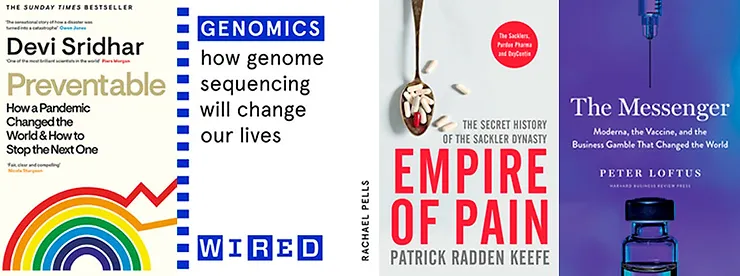This handy how-to guide for maintaining post-conference momentum asks pharma industry experts how attendees and their teams should prepare for and draw the best insights from in-person and virtual events
Words by Cheyenne Eugene
Generating and sharing ideas at pharma conferences should leave attendees feeling motivated and ready to put both feet on the gas and drive positive change upon their return to work.
However, if internal processes aren’t in place for attendees to take appropriate action from these winning insights, this motivation can dwindle and leave innovation in the pit lane. Forming a pre- and post-conference plan helps to streamline the process and, ultimately, turn ideas into all-important action.
Read on to find out how pharma companies can leave conferences with the right insights and motivations for change in this handy how-to guide.
1. Pick the right people
When deciding who should attend pharmaceutical conferences and events, it is key to have representation from a range of departments. Keren Leshem, CEO, OCON Healthcare, identifies marketing, business development, sales, communications, operations and management as the most appropriate functions and individuals to sign up. However, if spaces are limited, she suggests companies should “be picky but conscious of opportunities and costs”.
One such cost could even be event fatigue. Leshem recognises that attendees may return from in-person conferences feeling overwhelmed due to the strains of international travel and the whirlwind of “people, data, insights or activities”.
What’s more, hybrid conferences seem like they’re here to stay post-pandemic – but with this comes the risk of oversaturation. As Bertalan Meskó, PhD, Director, The Medical Futurist Institute, observes, events tend to be quite close together, even running directly into each other. This should be taken into consideration when deciding who attends, and companies should avoid exhausting the same attendees and make full use of on-demand conference sessions.
2. Stay one step ahead
Once attendees have been selected, teams should unpick where they are experiencing challenges or unknowns. This way, key knowledge gaps can be identified and attendees can then gather relevant information to feed back to their colleagues, rather than going in blind and being overwhelmed by the sheer amount of content and ideas being presented.
“Conduct research before the event to make sure you are aware of who’s presenting, speaking or attending,” advises Leshem. Prioritising will help to streamline the event, ensuring the most relevant content and contacts are acquired. “Make sure you check the box on all the people and opportunities you’ve pre-identified,” she adds.
3. Be attentive
In the virtual conference arena, event etiquette can take a back seat when a computer screen partitions attendees and speakers. “I’ve done hundreds of virtual events and I know how good it can feel to attend an event in the comfort of your own home,” says Meskó. “Still, respect the process and the preparations that event organisers and speakers have put into making an event possible.”
He urges online attendees to “choose not to do the laundry while listening to a speaker” and be present with the insights put forward. Key insights and statistics can easily be missed, and If employees are already taking time out of their usual workday to attend virtual events, coming away with valuable points remains ever-important.
4. Put in the legwork
“As a keynote speaker, I regularly get the notion that people want me to solve their problems,” says Meskó. “Taking notes of what speakers have to say is obviously not enough.” Although he acknowledges that his solution “takes, by far, the biggest amount of effort”, he encourages attendees and their teams to take the initiative and “put those pieces of information and ideas into actionable steps” in real time.
Leshem agrees, adding that she would “immediately send contacts and assignments from the conference to the team”. Ensuring that time has been put aside to debrief and plan after the conference is also a vital process if seeking tangible change as a result.
5. Go back for more
Event organisers often have “engaging and content-rich social media presences that aim to keep attendees’ attention in between events”, highlights Meskó. This provides an opportunity for attendees to ask for more detail on a topic, gain extra resources, get in touch with speakers and, importantly, provide feedback. The best post-conference etiquette? Share what went well and what didn’t so organisers can improve their events and offer more for attendees in future.
Concluding thoughts
As pharma companies continue to navigate the worlds of live and virtual conferences, the need for change will likely remain constant. Don’t allow gained insights to linger at the exit doors – make sure the thoughts and ideas for internal and external transformation make it back post-event.
The pharma book club
On this season’s pharma conference circuit, recommended reading was shared in abundance. Here, GOLD rounds up some of the most notable titles shared by speakers and delegates

Preventable: How a pandemic changed the world & how to stop the next one
Author: Devi Sridhar
Publisher: Viking
Explore how global politics shape health through the astonishing story of the COVID-19 pandemic, as well as the lessons learned from outbreaks past and present and the vision for how we can better protect ourselves from the inevitable health crises to come.
Genomics: How genome sequencing will change our lives (WIRED guides)
Author: Rachael Pells
Publisher: Penguin
Genome sequencing is one of the most exciting scientific breakthroughs in decades. WIRED journalist Pells tells the story behind the science and considers what scientific advances are possible with this technology, and what it means for the future of human life.
Empire of Pain: The secret history of the Sackler dynasty
Author: Patrick Radden Keefe
Publisher: Pan Macmillan
Turn an investigative eye to the staggeringly affluent and influential Sackler family, looking into their role in the devastating events that unfolded around Valium and OxyContin use during the opioid epidemic.
The Messenger: Moderna, the vaccine, and the business gamble that changed the world
Author: Peter Loftus
Publisher: Harvard Business Review Press
Read the story of how a revolutionary idea, heroic efforts, luck and tough decisions all culminated in the birth of one of the greatest achievements of the 21st Century to date: the successful delivery of one of the world’s first, and most protective, Covid-19 vaccines.









